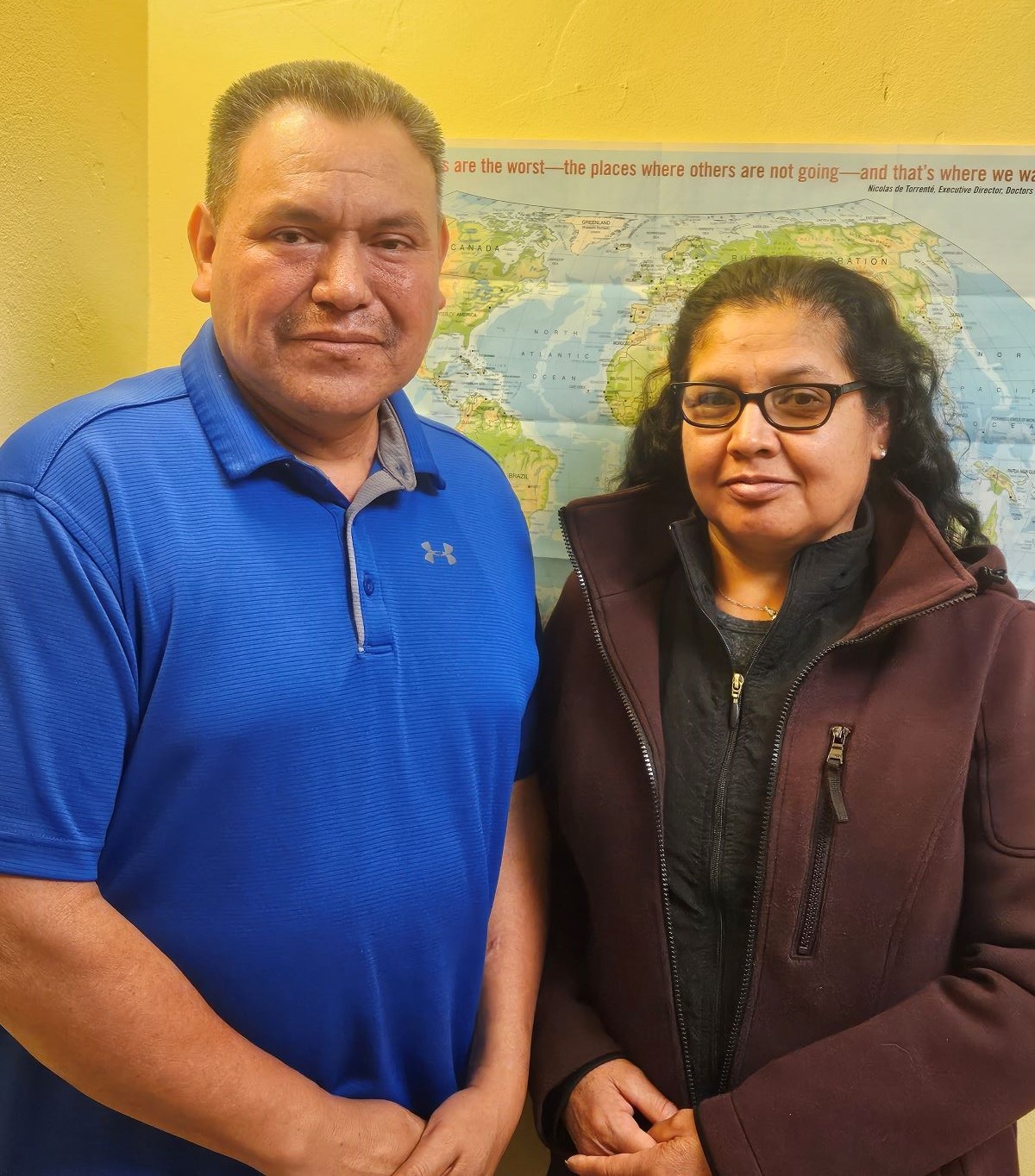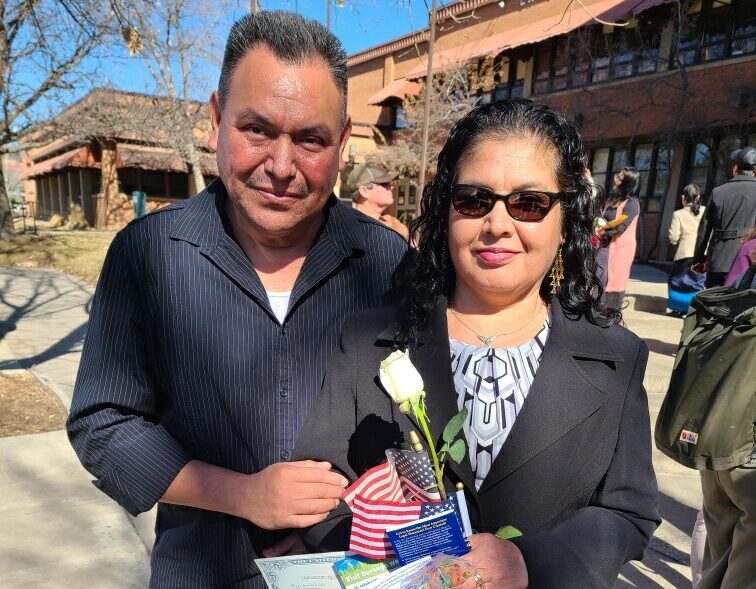One Couple’s Journey from Thin Ice to Solid Ground
The snowy tundra is vast. You pound through stiff, groaning snow. You come to a frozen lake. To go around it would set back your journey for too many hours. It risks your supply rations. It guarantees a cold night sleeping in the elements with no assurance of seeing dawn’s blush.
But this lake is thawing. You can hear it singing.
Ploom! Shum! Durf! Liquid thunder claps issue from cracks breaking the ice lake’s bones.
The quickest route to your destination—to warmth and food, to security—is straight across. You step onto the ice.
A Journey Begins
“I am from a little town and they don’t have a high school,” Obdulia Fonseca explains. She is recalling her youth in Jalisco, Mexico. “I studied for six years. I don’t have the opportunity to study more. To go to high school, we need to walk to another town. We don’t have money to do that.”
Without the opportunity to continue her education, Obdulia found work. She helped support her family at an age when most children in the U.S. get their first PlayStation. A decade later, when Obdulia was 22, her older brother proposed a different plan. They should find better-paying work in the U.S.
 Obdulia arrived in Los Angeles, California. She knew little to no English. She might have been terrified had she not already had relatives established in the huge city.
Obdulia arrived in Los Angeles, California. She knew little to no English. She might have been terrified had she not already had relatives established in the huge city.
While sharing these memories, Obdulia sits at attention in her chair. She is due to appear at Durango’s County Courthouse on February 29th, Leap Day. She is nervous ahead of the proceedings. Her appearance there will make history in this Old West town. Despite her natural charisma and a perpetual tendency to grin, Obdulia does not crave spotlights.
The worries over Leap Day vanish when she recounts a family party back in Los Angeles. “We met at that party,” she nods at Alfredo Fonseca, her husband for over two decades now.
Alfredo had also come to the U.S. from Jalisco just a few years before at the age of 20. The young man worked doggedly. He was competitive by nature. He can remember being an indifferent so-so student until high school rolled around. Then something clicked.
Alfredo recalls wanting to outdo his classmates. He says, “I want to be better than them so I studied late at night. Some students, they don’t need to study. Whatever they hear in class, that’s enough for them. Another person needs to work hard. Me, I need to work very hard to succeed.”
After the couple married, they obtained Geen Cards. They had an easier time finding work for better pay, but their freedoms were largely checked. Traveling outside of the U.S. can be tenuous. Minor offenses can result in immediate deportation. Still, the Fonseca’s chose to build a life in the U.S. They kept to the straight and narrow.
“I try to follow the rules,” Alfredo says. “I didn’t drink. I want a good record because I was thinking one day, I would get citizenship.”
In 2022, the couple moved to Durango, Colorado only to discover they were standing on shaky ground.
A Step in the Wrong Direction
You are more than halfway across the frozen lake. You can feel the entire ice sheet flex and bow beneath your feet, but it no longer bothers you. It is as gentle a movement as a sleeping baby’s chest, rising and falling with every breath.
Durm. Poing! The cracks in the ice far away continue to sing their galactic, underwater lullabies.
You press on until a boom issues nearby. It is as sudden as a gunshot. The crack you hear is like the sound of an entire brigantine snapping in half.
You see the frosty split in the ice only a couple feet from where you are.
Teer-teer-teer! Ploom-ploom! The laser guns under the water fire faster—no longer sniper shots. It sounds more like a civil war has erupted.
At the same instant you hear another gun shot, you see the white rope of a large crack flash between your feet. The fracture stretches before you.
Falling Through the Cracks
While adjusting to life in Durango, Alfredo was also in the middle of renewing his Green Card. By now, he was very familiar with the process. But, he could tell that something was different. An ebb and flow of paperwork that usually wrapped up in a few weeks had stretched out for over a year. Was the quagmire of national politics seeping into the offices overseeing his renewal? The rippling disruptions of bureaucratic dysfunction were evident.
If the wrong document fell through the right cracks, he could be booted back to Mexico. Separated from Obdulia; exiled in a country he had not known for over two decades.
No, Alfred resolved. He could not live under these threats. He and Obdulia began the process of applying for U.S. citizenship. It was not going to be easy, but luckily Alfredo had adopted a new outlook.
He explains, “In the last couple years, I learn to be positive. To say I can do it. That has helped me a lot! Before I would say maybe no, maybe not. And now I can say I can do it and I do it! I can try! I gotta try! When we apply for citizenship, I say I can do it. Always say that.”
Citizenship candidates face an arduous and expensive challenge. First, they must prepare for the Naturalization test, which includes reading and writing tests, as well as an oral civics test. Candidates must study 100 questions centered around the U.S. government’s history and design. Out of this pile of information, they’ll be tested on ten random items—six of which must be answered correctly. Next, they must complete an interview with an immigration officer where they showcase their English comprehension and communication skills. Add to all this the steep application fees and travel costs to and from the U.S. Immigration and Citizenship Services offices. Denver is the nearest site for Durango residents.
The Fonseca’s sought help from Compañeros, the Four Corners Immigrant Resource Center. For 25 years, Compañeros has provided a wealth of support services to immigrants, including bilingual assistance to navigate government systems, health care, employment rights and opportunities, and so much more.
Soon, all the documents were filed. The Fonseca’s now just had to prepare for their citizenship exams and interviews. They learned about the Durango Adult Education Center’s programs for citizenship assistance and English language classes. Citizenship candidates work one-on-one with a free tutor who helps them master the test content. Meanwhile, free English-as-a-Second Language (ESL) classes would prepare them to ace their interviews.
The couple enrolled, expecting to have plenty of time to prepare. They met with volunteer extraordinaire, Marie Roessler, who took on citizenship tutoring in 2010. Marie gave them a pre-assessment test. The couple did quite well. She gave them some homework and they scheduled a follow-up session. Soon after, the Fonseca’s got a call from Compañeros. The news was not good.
Evidently, snail-mail notices addressed to the Fonseca’s had gone astray. Their appointments for fingerprinting and exams were set. In fact, Obdulia had already missed her first appointment! Alfredo’s test and interview were now just days away. Alfredo fired up his old study habits.
“We practiced on the YouTube. I wrote the questions and the answers in my notebook. And as I was driving, I started studying,” he explains, meaning that even as he and Obdulia drove to Denver, they crammed for the test. “I learn that when you want something, you have to do more. Work hard. Study more. Stay late.”
Point of No Return
You hustle across the frozen lake. Every step you take triggers white spiderwebs to bloom beneath your feet.
All you hear are crackles and clicks. The underwater laser blasts and thunder claps drone like a broken harpsicord.
You are not far from the shoreline now. But even if you jump…will you make it?
Firm Footing
By November 2023, both Alfredo and Obdulia had successfully attained U.S. citizenship. Alfredo attended his swearing-in ceremony in Denver, the same day of his exam. A small snafu in some paperwork meant that Obdulia’s swearing-in would be delayed.

“I am nervous!” Obdulia confesses before the ceremony. “I will go down in the history of Durango!” She laughs.
Alfredo sums up their long journey this way, ““First, we can have more opportunity here. We can vote in the elections. We have some small way for our voices heard. And then we want to be part of the United States because more of our lives are here.”
The couple is looking forward to traveling back to Mexico to see their families more often. Alfredo is toying with the idea of opening his own business. But, for now, they want to continue taking ESL classes to improve their language skills.
Standing on solid ground at last, Alfredo has one burning message to share with his fellow citizens. He notes, “I want to say to the community to support the [DAEC]. It helps us to learn something else. To learn English and any careers we want. It’s a good place for the community. They have excellent teachers! They are positive. They have good attitudes. You can do it, you can do it! I think positive, and we got the citizenship!”


